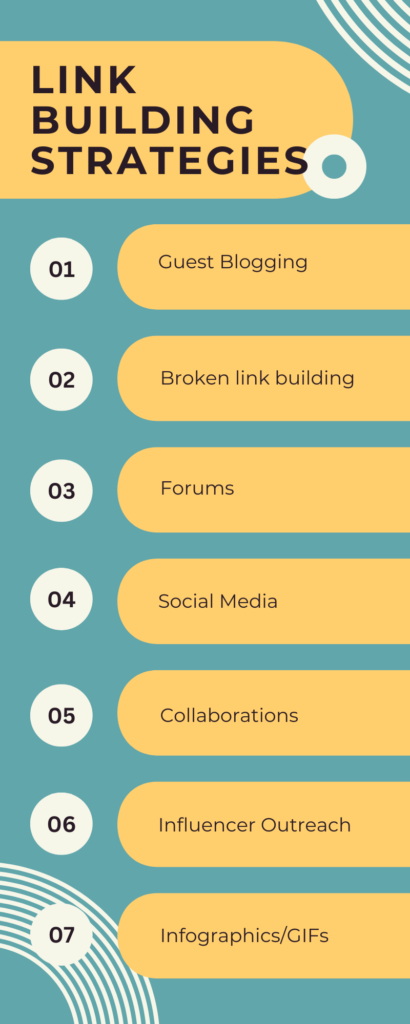Search engine optimization (SEO) is a crucial aspect of digital marketing that can help businesses improve their online visibility and attract more customers.
One of the most important strategies in SEO is link building, which involves acquiring hyperlinks from other websites to your own. In this blog post, we’ll delve into the world of link-building and explore effective strategies to enhance your SEO efforts.
What is Link Building?
Link building is the process of acquiring backlinks from other websites to your own. These backlinks signal to search engines that other websites consider your content to be valuable and relevant, which can help improve your website’s authority and increase its ranking on SERPs.
When you have quality backlinks from reputable and relevant sources, search engines view your website as a trustworthy and authoritative source of information. This can significantly boost your organic search rankings.
Importance of Link Building for SEO
Search engines like Google consider backlinks as a vote of confidence for your website. When authoritative sites link to your website, it signals to search engines that your content is valuable and trustworthy. This, in turn, may result in higher rankings for your website in search results.

Link building is also essential for enhancing the authority and relevance of your website. By obtaining links from relevant and authoritative sources, you are conveying to search engines that your website is also an authoritative source of information.
Furthermore, link building can drive referral traffic to your website. When users come across a relevant hyperlink on another site, they are more likely to click on it and visit your website.
Link building plays a vital role in improving the visibility and ranking of websites in search engine results pages (SERPs). Its ability to boost credibility, authority, relevance, and referral traffic makes it an indispensable strategy for any effective SEO campaign. So, if you want to improve your website’s organic rankings, invest time in developing strong link-building strategies.
Types of Links and Their Impact on SEO
Link building is a critical aspect of SEO, and understanding the different types of links and their impact is crucial. Not all links hold the same value, and knowing which ones to prioritize can make a significant difference in your website’s rankings.

- Internal links – These links connect one page of your website to another. They help search engines understand the structure and hierarchy of your site while improving user navigation. Internal linking also distributes authority throughout your site, boosting the visibility of important pages.
- Outbound links – These links point from your website to other authoritative sites or resources relevant to your content. External linking helps establish credibility and trust with search engines, as it shows you’re providing valuable information by referencing reputable sources.
- Inbound links (or backlinks) – It refer to when other websites link back to yours. Backlinks are a crucial element in determining the credibility and authority of your site in search engine algorithms. The more high-quality backlinks you have from authoritative domains, the higher the likelihood you’ll rank well in organic search results.
- Natural links – They occur organically when other websites find value in your content and choose to link back without any of your influence. Unnatural or spammy links refer to those acquired through black-hat SEO tactics like buying or exchanging links solely for ranking purposes, these can harm your site’s SEO.
By understanding the different types of links and their impact, you can develop an effective link-building strategy tailored specifically to improving your website’s SEO rankings.
Common Link Building Strategies
When it comes to link-building, several common strategies can help improve your website’s SEO. These strategies are centred around acquiring high-quality backlinks from reputable sources, which can in turn boost your website’s visibility and organic rankings.

- Guest Blogging – By reaching out to relevant websites and offering to write a guest post, you not only gain exposure to a new audience but also have the opportunity to include links back to your site within the content.
- Broken link building – This involves finding broken links on other websites and reaching out to the site owner or webmaster with a suggestion for replacement content ideally, one that includes a link back to your site.
- Forums – Participating in industry-specific forums or online communities can also be an effective way of building relationships and earning natural links over time. By actively engaging in discussions and providing valuable insights, you position yourself as an authority in your field while also gaining opportunities for link placements.
- Social Media – Sharing useful content on social media channels not only drives traffic but also increases the likelihood of others sharing or linking back to your content.
- Collaborations – Leveraging existing partnerships or collaborations with other businesses can lead to mutual cross-linking between websites.
- Influencer Outreach – It involves reaching out to influential individuals in your industry and building relationships with them. By securing guest posting opportunities or collaborations with these influencers, you can obtain quality backlinks and increase your brand visibility.
- Infographics/GIFs – Creating compelling infographics or visual content is another advanced tactic worth considering. Infographics are eye-catching, easy to read, and highly shareable, making them great assets for generating organic backlinks. When creating infographics, be sure to focus on a relevant topic and present information in a clear and visually appealing way.
These are just some of the common link-building strategies. Although these link-building tactics require more time and effort, they can lead to significant improvements in your website’s SEO and ultimately drive more traffic and conversions.
Dos and Don’ts of Link Building
When it comes to link building, there are certain dos and don’ts that you need to keep in mind to ensure your efforts are effective and beneficial for your website’s SEO.
DOs
- Focus on Quality over Quantity – Instead of going after a large number of low-quality links, prioritize getting high-quality backlinks from reputable websites. Quality links carry more weight and have a stronger impact on your search engine rankings.
- Diversify Your Link Profile – Build a diverse portfolio of backlinks by targeting different types of websites, such as industry blogs, news sites, and authoritative directories. This helps establish the credibility and relevance of your website in the eyes of search engines.
- Build Relationships with Influencers – Connect with influencers in your industry through guest blogging or collaborating on projects. By establishing relationships with influential individuals or organizations, you increase the chances of gaining valuable backlinks from their networks
DON’Ts
- Engage in Black Hat Techniques – Unethical tactics like buying links or participating in link schemes can harm your website’s reputation and search engine rankings. Stick to legitimate strategies for acquiring backlinks to avoid penalties from search engines.
- Over-Optimize Anchor Text – While anchor text is important for indicating the relevance of linked content, over-optimizing it with exact match keywords can raise red flags with search engines. Use natural variations of anchor text to maintain a balanced link profile.
- Ignore Internal Linking Opportunities – Internal linking plays an important role in improving website navigation and distributing authority across pages. Make sure to include relevant internal links within your content whenever possible to enhance user experience and boost SEO.
Keeping these dos and don’ts in mind will help you build a strong foundation for successful link-building campaigns while adhering to best practices recommended by search engines. Remember that quality always wins over quantity when it comes to link building, so focus on acquiring high-quality backlinks from reputable sources to improve your website’s SEO.
Measuring the Success of Your Link Building Efforts
Measuring the success of your link building is crucial to determining the effectiveness of your SEO efforts. Here are some metrics you should monitor to evaluate the success of your link building campaigns.
- Organic Search Traffic – One way to measure the effectiveness of your link building is by monitoring your website’s organic search traffic. If it has increased since implementing your link-building strategies, this indicates that your efforts are generating more visibility for your site in search engine results.
- Relevance and Quality of Backlinks – Another essential metric to consider is the quality and relevance of the backlinks you’ve acquired. Are they coming from reputable websites within your industry? Are they driving targeted traffic to your site? By analyzing these factors, you can determine whether or not your link-building efforts are attracting valuable links that contribute positively to SEO.
- Keyword Rankings – Monitoring keyword rankings is also important when evaluating the success of link building. Have specific keywords improved their positions in search engine results pages (SERPs)? This demonstrates that backlinks associated with those keywords have helped boost their visibility and authority.
- Referral Traffic – Tracking referral traffic from external websites can provide insights into which sources are sending visitors who click through and engage with your content. This data can help identify successful partnerships or opportunities for further outreach.
- User Engagement Metrics – Don’t forget about user engagement metrics such as bounce rate, time on page, and conversion rates. These indicators highlight whether users find value in navigating through linked content on other sites and ultimately converting into customers or subscribers.
By regularly assessing these metrics and comparing them over time, you will gain a better understanding of how successful (or not) your link building efforts have been. Remember that effective measurement requires patience and consistency, it may take some time before noticeable improvements occur.
Conclusion
In this article, we have discussed more about link building and its significant impact on SEO. Link building plays a vital role in improving the visibility and ranking of websites in search engine results pages (SERPs). Its ability to boost credibility, authority, relevance, and referral traffic makes it an indispensable strategy for any effective SEO campaign.
By developing strong link-building strategies and staying up-to-date with industry best practices, you can strengthen the online presence of your website and attract more visitors organically.



